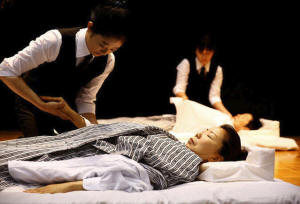|
"I
practiced every day to prepare for this competition," said a
smiling Rino Terai after her win over three other finalists.
"I took videos and made improvements by asking myself, does this
look beautiful? Am I treating the deceased kindly?"
Japan's Shinto religion believes that the soul is impure shortly
after death and the process of dressing a body - usually in
front of close relatives only - purifies the deceased spirit
before it is sent off to the "other world".
Japan's ageing society has increased demand for undertakers with
special skills, said Kimura Kouki, head of the Okuribito
Academy.
"There are about 2,000 undertakers whose expertise is in
dressing the deceased, but their skills vary a lot," he said.
"I wanted this competition to be a way to spur undertakers to
improve their skills."
The four contestants dressed live human volunteers laying on
mattresses arranged on a stage. They were observed by three
judges as funeral music gently played in the background.
The four were judged on the grace of their movements and their
ability to dress the body without revealing too much bare skin.
"The movement of their hands were really beautiful," Akane
Matsuda said after watching the competition.
(Reporting by Megumi Lim, editing by Darren Schuettler and Nick
Macfie)
[© 2017 Thomson Reuters. All rights
reserved.] Copyright 2017 Reuters. All rights reserved. This material may not be published,
broadcast, rewritten or redistributed.
 |
|






